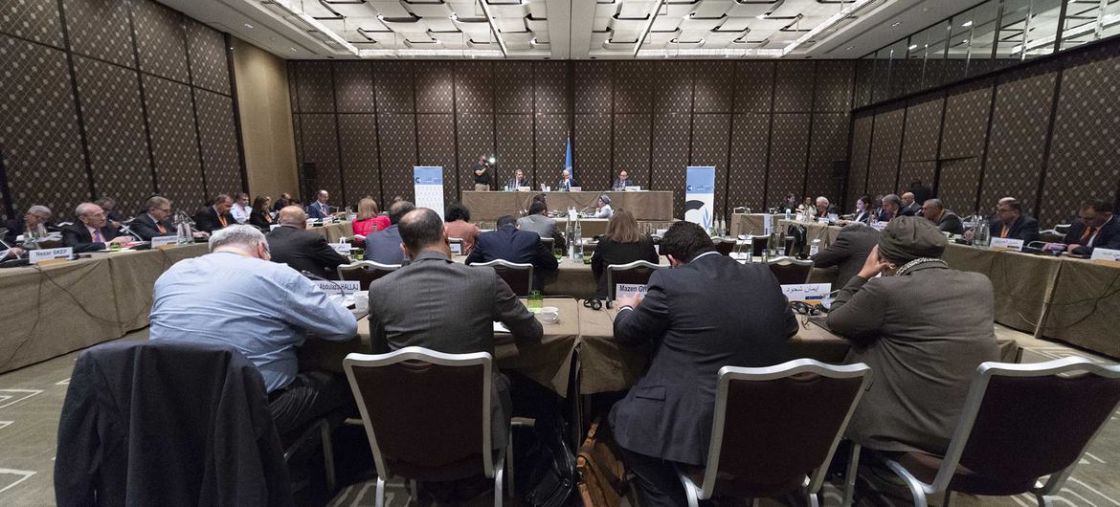- Editorials
- Posted
Kassioun Editorial 1073: The Constitutional Committee: The Venue, Speed, and Prospects of its Work!
Last Friday, the eighth session of meetings of the small body of the Constitutional Committee concluded in Geneva, and as usual, with no results.
What can be noticed from the atmosphere inside and around the session, is that the issue of the venue of its meetings is again being deliberated. The Moscow platform was, and still is, proposing the transfer of the Committee’s work to Damascus with the necessary guarantees and in the presence of the UN. This proposal still stands and is required, in parallel with reaffirming that the Committee itself is not the solution, but rather the key to it. The solution was and still is the full implementation of UNSC Resolution 2254, starting with the formation of the consensual transitioning governing body.
Furthermore, with regard to the meetings venue, it has become an obstacle to the work. Within the sharp polarization in the world today, Geneva, as a result of Switzerland’s stances, has lost its previous supposed neutral position, and consequently its symbolism as a meeting point among the various global powers, and implicitly among the various forces involved in the Syria file. This is not to mention that the logistical aspect alone is enough to raise the issue of venue – Geneva as an obstacle to the continuity and productivity of the Committee’s work.
One of the relatively new topics is the talk about accelerating the holding of the Committee’s sessions, so that the average shifts from a session of five working days every four months, to less than that, possibly a session every two months, or even every month. However, what is certain, which is proven by at least the last two sessions, is that speeding up the sessions does not mean at all accelerating the work. The necessary condition for the acceleration of the work is the presence of the political will to accomplish it.
What is more dangerous than all of that is the relentless work to change the basic function of the Constitutional Committee. Since its establishment, the Committee was not intended to be the solution; rather, it was precisely a tool to prevent the killing of the political solution, and thus a tool to keep UNSC Resolution 2254 alive.
What has happened and is happening over the past months, in parallel with the so-called “step-for-step”, as well as in parallel with the formal suggestions that there is some progress in the work of the Committee, even by the UN and its envoy, has allowed forming a conclusion that there are those who are working to transform the Committee from a tool to prevent killing the political solution, to a thick smokescreen behind which there are attempts to pass “deals” whose purpose is to jump over the entire political solution, and over UNSC Resolution 2254 in particular.
The main position regarding the Constitutional Committee and its relationship to the political solution remains in accordance with the following frameworks and criteria:
First: The Committee should be preserved as one of the tools for reaching the solution, and not to turn eyes away from it.
Second: In order for the Committee to be preserved and pushed towards performing its function, its venue should be moved with guarantees, and its work should be continuous without interruption and should be public. Its composition should also be developed to include those who have been excluded.
Those who are demanding the immediate termination of the Committee’s work, or those who are procrastinating and prolonging its work so that it goes nowhere, are ultimately behaving in the same manner and for the same objectives. That is, to jump over UNSC Resolution 2254. All of those rely in essence, whether openly or covertly, on Western behavior, particularly, the US’s, which acts towards UNSC Resolution 2254 the same way it had towards the Minsk Accords, and towards Resolutions 242 and 338, and others.
The good thing is that international and regional balances, as well as Syrians’ desires and interests, all go against the direction for which the extremists of all sides hope. The fruition of these balances and Syrian interest, though implementing the comprehensive political solution according to Resolution 2254, is the fate awaiting us, and the waiting time for which patriotic forces should push together towards shortening.


